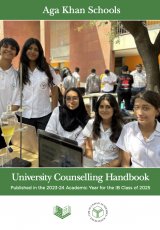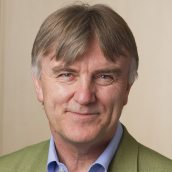Guest Editorial: Dr Graham Ranger
In our first guest editorial, Academic Director Dr Graham Ranger shares his opinion on the facets of the Academies that are distinctive. He reflects on how the Academies prepare students for a rapidly changing world.
The guest editorial offers a window into the Academies and the developing network. We have the benefit of working with many partners in and beyond AKDN, who enrich what we do. In future issues of the newsletter editorial, some of our partners will offer their perspectives on aspects of our work through their close involvement with us.
My first contact with the Academies was in February 2016 and I joined as Academic Director in January 2017. My selection process included visiting the Academies in Mombasa and Hyderabad, reporting back, and spending several days meeting future colleagues in Aiglemont. Overall, the five-month process (yes, five months!) was educative, pleasurable, fascinating and demanding. I began to think differently about my own career, and how I could use my experience to support the development of the Academies’ network, about sustainable development and about the role of education in long-term, societal development. It was an important introduction to our work and to the way His Highness prioritises the education of the young as a catalyst for the development of societies.
Since joining, I have probably spent about 50-60% of my time ‘on the road’ and have been to each of our three Academies at least four times as well as to other key locations where AKDN is active. My role in the Academies Unit is a network-wide one, overseeing and helping to develop all things educational to make the Academies as rich an environment for learners as possible. I was accustomed, in previous roles I have held, to having high levels of authority, decision-making capability and accompanying accountability. Here, we operate far more as a team. The accountability and responsibility remains, but the institutional memory in the AU is all important in bringing to the fore the previous guidance received, earlier developments, what worked well for our students, what worked less well. I try to see everything I do through two lenses, written here as questions: To what extent is what I do scalable (i.e. as we build the network); and to what extent is it sustainable?
I have been here for a year. I relocated from The Netherlands where I held a global role in international education. Previously, my assignments were in India, Hong Kong, Cameroon and in England, my home country, where I held a national role in education. Here, I want to highlight just a few facets of the Academies that are distinctive, and, with due humility as a newcomer, offer a few reflections.
Everyone I have spoken to talks admiringly about the compelling nature of His Highness’ vision for the Academies network. Candidates for posts will inevitably mention this first, when asked about their reasons for wanting to join us. I am proud to be involved with the Academies because of His Highness’ vision but I am challenged, along with everyone else, by the magnitude of the task of implementing it together. I was attracted by the vision of creating a better world through developing ethical, local leadership and by using predominantly local teachers to lead this endeavour. The localised emphasis gave the Academies a relevance to their contexts, and the opportunity for the Academies be a catalyst for meaningful, sustainable development. What are some of the things we are doing to help realise His Highness’ vision?
We are not just another network of schools but part of a bigger and longer-term vision for raising the quality of life in the communities we serve, drawing on the skills of local teachers, and educating talented local young people of high potential as ethical leaders of the future. Just as His Highness wrote when the Academies were established as an integrated network of schools, we live in a time of rapid change – change that is often unpredictable and not always positive. How are we preparing students for this world, a world and a future that is uncertain?
First, we identify students of talent and potential, many from backgrounds with few material resources. Assessment of potential is never easy. There are challenges in, for example, the validity and reliability of the assessments when one is bringing students who may have little formal school background or schooling that is so different from that at the Academy that they find visiting the Academy overwhelming. I have been very impressed how we use a breadth of assessments to identify potential, focussing on the oral and well as the written articulation of ideas. We are looking for leadership, for intellectual acumen, for resilience and character, qualities needed in a successful Aga Khan Academy student. The latest research in the field of giftedness, of talent identification and of identifying potential in a young person drives the development of these assessments. We aim for consistency in assessing, with Admissions Teams in Mombasa and Hyderabad (and Maputo in future) working together to moderate the outcomes, along with those identifying students of high potential in Tajikistan and Afghanistan. Bringing students to an Academy means a life change in every respect. Our challenge is how do we identify, nurture and develop such talent to fulfil potential, not only in the Academy, but then at university and beyond. It’s heartening that over 40% of our early graduates from AKA Mombasa have now returned to East Africa to work or study. Our local, ethical, well-rounded leader of today and tomorrow!
Second, to bring the best out of outstanding young people, we need to identify, develop and retain outstanding young local teachers. We need to develop them to be the school leaders of tomorrow’s Academies. Our Teacher Preparation Programme has been recognised by the IB as the only fully school-based (as opposed to part university- based) programme in the world, preparing bright young education graduates to be IB teachers in the Academy, each following a 15-18 month internship. I was very proud to be present at the graduation of our TPP graduates in Maputo, who had been partly trained in Mombasa and who are now doing magnificent work in teaching the PYP and MYP in their home country, Mozambique, in the Aga Khan Academy, Maputo. Our challenge is to continue to develop such talent, to retain them and support them as they gain in experience. IB teachers are very marketable. We need to ensure that the all-round quality of professional life and the contribution to His Highness’ vision is attractive and compelling.
Thirdly, there are many outstanding IB schools in the world. We are, however, distinctive IB schools, aspiring for excellence. I see the Aga Khan Strands being the bridge between His Highness’ vision and the learning experiences of our IB students. We have an emphasis on values: on ethics and pluralism- which marries well with the IB’s mission. Our obligation is to contextualise the IB programme, to localise it without making it parochial. In the Peterson Lecture of 2008, on the IB’s 40th anniversary, His Highness talked of the IB as ‘one of the great seminal institutions of our era. I say that because the IB programme incarnates a powerful idea, the confidence that education can reshape the way in which the world thinks about itself’. IB schools have traditionally played a role in educational innovation. The Academies Network can be a testbed for new IB courses and ideas, giving professional opportunities to our teachers and exciting learning opportunities for our students. What is different about us? Our mission to implement His Highness’ vision makes us special. We are socio-economically diverse, which is unusual. We have customised the IB curriculum formally, through the Strands, making our programme unique. We work mainly with local students and teachers and have a commitment to the locality, country and region in which each Academy is located. Moreover, we are part of a wider development strategy, that of AKDN. Our challenge is to harness these resources, the richness of the network, for the benefit of our students, staff and families.
Finally, we need to continue to be forward-looking, not recreating an anachronistic model of education in future Academies. To quote His Highness, ‘an education must equip students with the tools that enables them to adapt, and thrive, in a world characterised by change’. Therefore, in my words, we must constantly re-evaluate what we do in the light of the students’ changing needs and circumstances. Many of the features of the Aga Khan Academies are special, the physical and the human. We are producing ethical, well-educated local leaders who will make a positive difference to their societies. However, school education must also be futures-focused as we are preparing students for a world we cannot predict. Consequently, we must continue to emphasise the integration of technology, the importance of creativity and design, the value of critical thinking and creative problem solving, but all within a strong ethical framework. The IB aims to help students become active, compassionate and lifelong learners who understand that other people, with their differences, can also be right. His Highness goes further: in delivering the honourable Jodidi lecture at Harvard University on Thursday, November 12th, His Highness the Aga Khan urged for a “pluralist, cosmopolitan society,” one which “not only accepts difference, but actively seeks to understand it - and to learn from it.” This is our challenge and our moral obligation to our students.
By Dr Graham Ranger
publications





